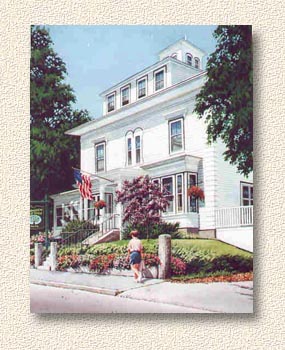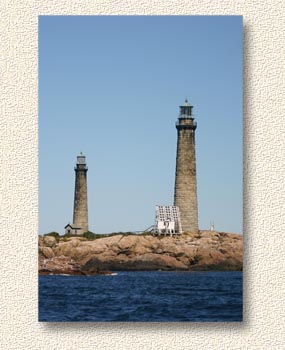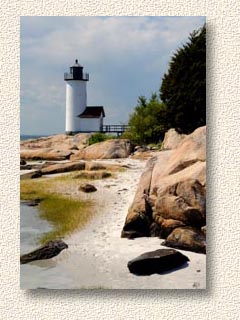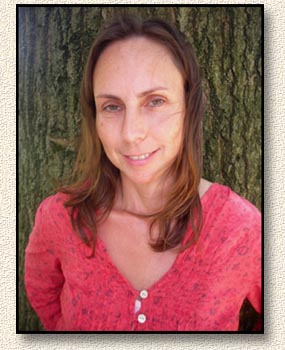OC: You hail from Toronto but have based your first book-length
fiction
on a fishing village in Massachusetts. Obviously, you have had some
contact with Rockport, but what really triggered your decision to tell
a story based on this other time and place?
CKH: I'm still very much a Canadian (with a green card!)
and the
decision to tell a story set in a 19th century fishing village in
Massachusetts was somewhat accidental. In 2002, after a New England
hike, my husband and I decided to recover from it in Rockport,
Massachusetts on
Cape Ann. It was a fairly random choice, right out of the AAA book as
we rode along the coast. Not too romantic, I suppose and I was
unprepared to fall in love with it, but out of that visit grew the
seeds of Marianne Elizabeth Parsons' life. The inn where we stayed (The
Linden Tree Inn) enchanted me with the notion of lives lived there
before, just as so many houses do that are 100-plus years old.  And
after several visits to the same Inn over a year or two, I began to
imagine a story taking place in that very house.
And
after several visits to the same Inn over a year or two, I began to
imagine a story taking place in that very house.
Because I've always favored books set in other times and places, it
eventually felt comfortable for me as a writer to create a life and a
story in a voice from another era. As a high school student, my fiction
sounded Victorian; the voice didn't match the time in which I'd set my
stories and I regularly got in trouble with my teachers for that.
But with this novel, I had found a place to 'plug in' Marianne's voice,
as anachronistic as that might sound for the era. The notion of a
sea captain's wife may not be unique, but there are many stories told
about similar kinds of characters and the stories are as unique as the
writers who dream them up.
But I've fast forwarded through the trajectory that landed me fully in
the 1850s. Earlier, I said 'eventually' about being comfortable with
the voice, time, and place because my novel’s setting was modern (early
21st century) in its initial form; set in a house in Rockport,
Massachusetts,
yes, but with a contemporary female as the protagonist and a Victorian
female as a ghostly companion. I wrote a few hundred pages of that
modern story, interspersing it with journal/epistolary bits from the
female character who'd lived in the same house 150 years before. It
felt hokey and too done. Finally, I was bored with my modern novel's
protagonist, feeling too close to her; there just wasn't enough
authorial distance between us and I found myself getting peeved at her,
at myself, and stalling terribly. But the character of Marianne
Elizabeth Parsons, whose journals I'd already begun to create as a part
of this contemporary story, were taking on breath of their own.
Finally, I surrendered to her and became immersed in building her world
and her life into the novel I've been writing since ... well, I don't
want to admit when I started.
OC: How did you balance the opposing tugs of research and
invention?
When we spoke by phone we agreed that research exerts an awful pull, a
sort of vortex of truth that can threaten to drag under the little
world we intend to invent. But at some point we pull back from that
vortex and get on with the job of creating a universe of our own. How
did you make the transition?
CKH: I really like the way you phrased that; opposing tugs of
research
and invention. And it is, in an almost literal sense, a great, big
vortex, fitting to the process. Early in my first draft of the novel in
its current form, I fell hard for the romance of research, of
fact-finding and truth-seeking. It cast a spell not unlike the town of
Rockport and provided me numerous costly opportunities to visit the
town and stay in the Linden Tree Inn. You bet I justified each
return to Cape Ann as a research trip, taking my husband along for the
ride.  What grew out of that tug between the writing and
research was
what I like to call the Blurry Realm between the world I was creating
and the one I was experiencing as a writer in search of authenticity. I
fell harder for that research for a while so that the novel was
neglected; after all, with research came results, tangible and
thrilling results. There were people in the town of Rockport who were
eager to help, sitting with me for hours of conversation that tossed me
into the world I was creating; there were curators of historical
societies, town historians, friendly innkeepers, librarians, long hours
of musing in the settings that existed in the real world, and now in my
novel, during which I felt a commitment to research that threatened to
supplant the urge to write the book.
What grew out of that tug between the writing and
research was
what I like to call the Blurry Realm between the world I was creating
and the one I was experiencing as a writer in search of authenticity. I
fell harder for that research for a while so that the novel was
neglected; after all, with research came results, tangible and
thrilling results. There were people in the town of Rockport who were
eager to help, sitting with me for hours of conversation that tossed me
into the world I was creating; there were curators of historical
societies, town historians, friendly innkeepers, librarians, long hours
of musing in the settings that existed in the real world, and now in my
novel, during which I felt a commitment to research that threatened to
supplant the urge to write the book.
What snapped me out of it was that I was also in graduate school for my
MFA and had to commit to a thesis to graduate. My kids and my husband
had supported and cheered my efforts through the early writing. When
they saw how I'd begun to stall, that this tug between the two
processes tortured me a little, I simply told myself that the research
had to stop; at least, it had to pause until I had a proper, full draft
of the novel. Ultimately, though I did look up a few things during
revision in order to give at least some credence to herbal cures,
kitchen gardens, and the superstitions of 19th century New England
fisherman (still working on all of those things), the writing became
the more important thing again and research was put on hold.
Of course, I’ve arrived at that stage when giving truth to the world
I’ve created is important again. Research will be necessary now, so
it’s probably time for one more trip to the region of inspiration!
OC: The journal form, which you employ in Seagoing Vessels, may
tempt
authors with rewards and dangers. It's clearly engrossing to share the
protagonist's world from day to day. At the same time, the author must
come to terms with the narrative demands for suspense that almost every
author uses to drive a story forward. I appreciate that you haven't
completed the manuscript yet, but how do you think you're coping with
these demands?
CKH: Well, admittedly with some difficulty. Throughout the
writing of
the novel, I've encountered some real resistance to the journal format
and I know it's going to be detrimental to my novel if I don't infuse
it with the tension of a traditional narrative (even if I decide to
keep the journal/epistolary structure).  Yet, while the story is linear,
I've recently begun to realize that certain things can be moved around
to accomplish the suspense that might be missing, so I know that's part
of my strategy as I revise for about the fourth time. The deceptively
easy - and even forgiving - thing about writing a novel is that
initially you can write and write before things have to happen because
you don't have a real limit for length. But when it idles in place,
something has to shift. Suspense isn't my specialty; I tend to feel
most comfortable in character development, so I'll be leaving my
comfort zone and answering to that demand to keep the story engaging
from start to finish. If it means re-shaping the structure, well,
I'm vaguely considering the possibility.
Yet, while the story is linear,
I've recently begun to realize that certain things can be moved around
to accomplish the suspense that might be missing, so I know that's part
of my strategy as I revise for about the fourth time. The deceptively
easy - and even forgiving - thing about writing a novel is that
initially you can write and write before things have to happen because
you don't have a real limit for length. But when it idles in place,
something has to shift. Suspense isn't my specialty; I tend to feel
most comfortable in character development, so I'll be leaving my
comfort zone and answering to that demand to keep the story engaging
from start to finish. If it means re-shaping the structure, well,
I'm vaguely considering the possibility.
OC: There is a multitude of mid-nineteenth-century historical
novels
and not a few set in New England. Ahab's Wife was a recent success. Do
these predecessors affect your work in any way?
CKH: Confession? I've never read Ahab's Wife, nor many other
books like
the one I'm writing. Part of the reason for that is fear of
over-absorption and accidental, hmmm ... emulation. I think what has
truly
affected my work is the sensibility of the works that have come before
it. So, it doesn't have to be a book set in a New England coastal
village to inspire me. It can be a Jane Austen (Sense and Sensibility),
Thomas Hardy (Tess of the D'Urbervilles), Tracy Chevalier (name any one
of hers), Anita Shreve (ditto there), or D.H. Lawrence novel; all of
these authors' works, written in the time in which they were set or
written today and set in a bygone era, have affected and inspired my
story and my approach in some way.
OC: After four years, you're nearing the end of the Seagoing
Vessels project. What problems are you facing now, so near the end?
CKH: Quite literally, I'm facing the End. When I began to
write
it in earnest four years ago, determined to finish it for graduation
from the MFA program, my thesis advisor and dear friend told me to
write an ending already. She said that simply doing that would help me
write toward a finish line and that I could change it, of course. So, I
wrote that ending, hurtled toward it, engrossed in the writing and
convinced that it might be the conclusion I needed after all. Well, it
isn't. So now I'm faced with the very real specter of an unearned
ending that I need to correct. To do that, I'll be re-reading the
story, resisting the urge to do another line-edit (a false sense of
accomplishment seems to settle on me when I do that), to turn over
little, inconsequential fact-finding stones that will lead to more such
stones. My biggest problem is that I get side-tracked very easily. Time
isn't on my side, though, with a teaching job that ends in June and
begins in September and, of course, a husband, three kids and two dogs
who all need love and attention, willing as they are to give me the
time and space I need these last several years. (Oh, my, am I into
several?)




And after several visits to the same Inn over a year or two, I began to imagine a story taking place in that very house.
What grew out of that tug between the writing and research was what I like to call the Blurry Realm between the world I was creating and the one I was experiencing as a writer in search of authenticity. I fell harder for that research for a while so that the novel was neglected; after all, with research came results, tangible and thrilling results. There were people in the town of Rockport who were eager to help, sitting with me for hours of conversation that tossed me into the world I was creating; there were curators of historical societies, town historians, friendly innkeepers, librarians, long hours of musing in the settings that existed in the real world, and now in my novel, during which I felt a commitment to research that threatened to supplant the urge to write the book.
Yet, while the story is linear, I've recently begun to realize that certain things can be moved around to accomplish the suspense that might be missing, so I know that's part of my strategy as I revise for about the fourth time. The deceptively easy - and even forgiving - thing about writing a novel is that initially you can write and write before things have to happen because you don't have a real limit for length. But when it idles in place, something has to shift. Suspense isn't my specialty; I tend to feel most comfortable in character development, so I'll be leaving my comfort zone and answering to that demand to keep the story engaging from start to finish. If it means re-shaping the structure, well, I'm vaguely considering the possibility.